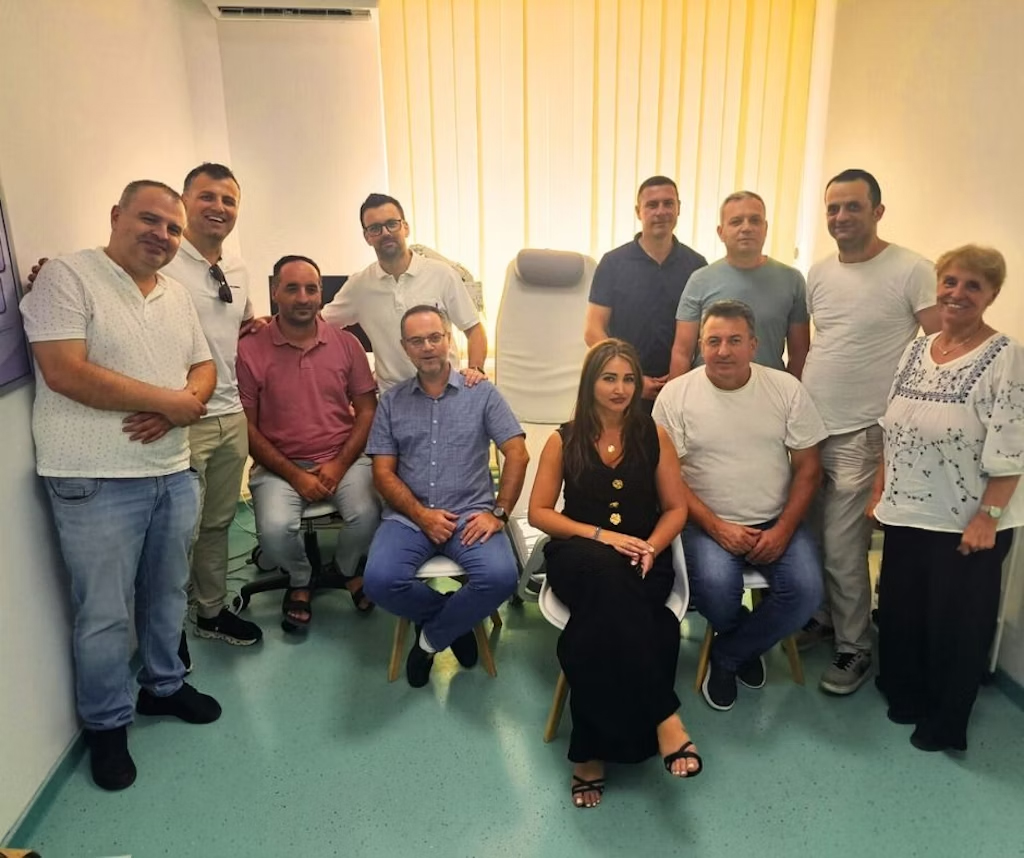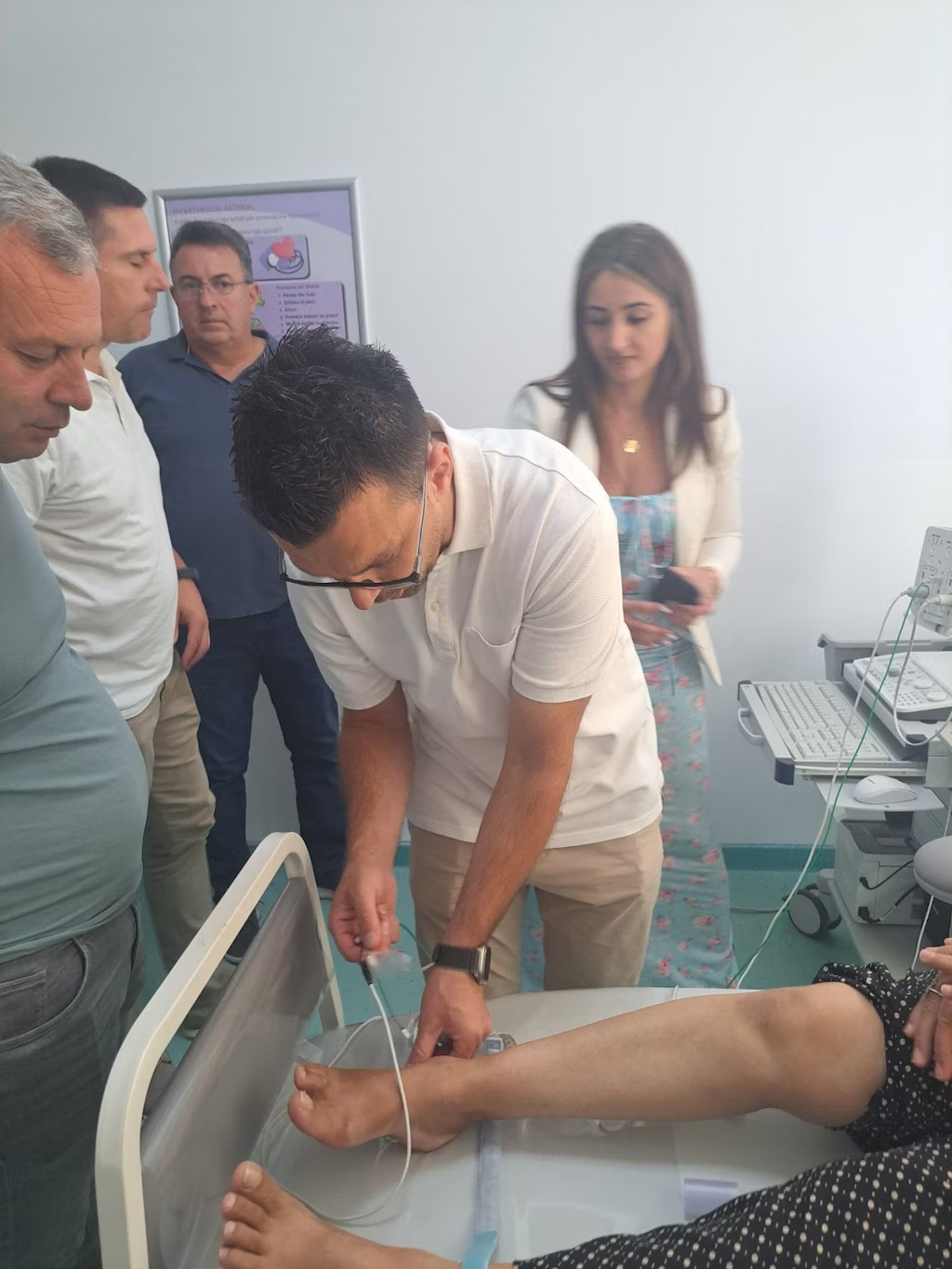Kosovo’s Hospitals Bring Diabetic Complications’ Diagnostics Closer to Patients
When Virxhina Salihu settled down for her first Electroneuromyography (ENMG) test at the General Hospital of Gjakova, she did not expect to be part of something larger than a routine medical exam. “It felt good to undergo the examination without having to travel outside of the city,” said Salihu, who also works in hygiene maintenance at the hospital. “I did a much-needed examination, but I also did my part in doctors’ further education on how to use the equipment.” Her experience reflects a shift that is taking place in Kosovo about the delivery of healthcare across the country.

Kosovo Neurologists Completed ENMG Training
Up to now, patients in municipalities like Gjakova and Peja had little or no access to advanced diagnostics for diabetic neuropathies. For individuals living with non-communicable diseases (NCDs), particularly diabetes, this often meant travelling more than 80 kilometres to the capital, Prishtina, for diagnosis of conditions that can silently worsen over time. Many patients, thwarted by a range of reasons, just went without. The consequences typically came only after it was too late to respond.
Noticing this pressing gap, the Integrated Health Services (IHS) Project started a coordinated effort to introduce ENMG diagnostics to the country’s regional hospitals. ENMG is a diagnostic method used to assess the health of muscles and the nerves controlling them. In people with diabetes, the technology is vitally significant: it identifies neuropathy symptoms at an early stage, tracks the progression of the conditions, and guides timely interventions before complications lead to adverse outcomes.
As a part of the program, ENMG equipment was purchased for the general hospitals in Gjakova and Peja. The project went beyond just bringing the equipment, however. It was also designed to build further local expertise through hands-on training for neurologists from across Kosovo.
“This training has brought together doctors from general hospitals of Kosovo to refresh our knowledge in the field of electromyography,” said Dr. Valon Shala, one of the participants. For Dr. Adnan Biqku, the structure of the course was key: “The training is organized in a way that enables us to correctly use the method for diagnosing patients’ conditions.” Led by Dr. Vera Kukaj and Dr. Dren Boshnjaku, the training aimed to equip doctors with both theoretical knowledge and practical skills, to ensure that the procedure would not only be technically sound but also routinely available in outpatient departments where patients can access it directly, without having difficulties to navigate current referral pathways.
“The aim is to strengthen the human resources who will perform this procedure on patients,” said Dr. Boshnjaku. The project’s significant financial contribution to make this equipment available at both sites is greatly appreciated by the institutions. “In addition, two ENMG machines have been provided and, as a result, the two regions of Gjakova and Peja will now have access to this service in their respective hospitals, which also helps reduce the burden on the University Clinical Center of Kosovo. Moreover, the service is now closer to patients’ places of residence, and at the same time, the medical staff present at the hospitals is able to provide a qualified service.”
The ENMG diagnostics are already improving patient care. People no longer have to make the trip to the capital to receive this important diagnostic. For Dr. Ilire Zajmi, one of the attendees, the change is a positive one. “We are the first group of specialists undergoing this kind of training, so I believe it will be of great value for the patients. Until now, the population of Gjakova hasn’t had access to this kind of service. From now on, it will be available at the Gjakova hospital.”

ENMG Training for Doctors Underway at General Hospital of Gjakova, Kosovo
For patients with diabetes especially, early detection of complications is all-important to ensuring quality of life. If caught timely, neuropathy can be managed to prevent severe outcomes such as chronic pain, loss of mobility, or amputation of limbs. If it goes undetected, it silently progresses.
“This initiative is aligned with the national health strategy,” said Dr. Edmond Komoni, acting director of the Neurology Clinic at the University Clinical Center in Prishtina. “It improves access and quality across all levels of care by strengthening modern healthcare capacities at the general hospital level.”
The incorporation of ENMG into outpatient departments in regional hospitals is not only decentralizing treatment but also reflects the broader mandate of the IHS Project to contribute to a more integrated healthcare system in Kosovo. By linking further primary, secondary, and tertiary care, the project ensures that patients receive timely, appropriate services at each point during their health journey. Such coordinated and localized access to diagnostics is essential in managing chronic conditions effectively.
As noted by Dr. Boshnjaku, ENMG gives patients and doctors alike the means to monitor disease progression with high accuracy. It allows damage to the nerves to be detected earlier on and prevents complications which could potentially be life-threatening or life-altering from occurring. Most significantly, perhaps, it enables patients to manage their condition in a way that is optimized to preserve quality of life, perhaps the most valuable outcome of all.
The early returns are good. More patients are taking advantage of the service. Doctors report heightened awareness among their patient populations about the risks of complications and the benefit of follow-up diagnostic procedures. More people taking advantage of this newly available examination means more people can identify their health problem at an earlier, more treatable stage.
This is how things improve, quietly but powerfully and endure. When patients know their risks, when doctors have the know-how and tools to respond, and when services are available in all the points in the health system, care becomes not just better, but kinder. For Salihu, the impact was immediate and personal. For many more, to have ENMG services come to their regional hospitals is a turning point in experiencing and receiving healthcare, a few steps from home.